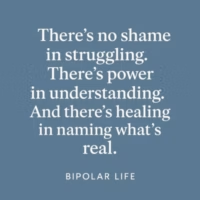🦠 How Bipolar Is Diagnosed (and Why It’s So Often Missed)
Getting an accurate diagnosis for bipolar disorder can feel like navigating a maze in the dark. For many people, it takes years—sometimes a decade or more—to finally hear the words “bipolar disorder” from a professional. I was one of those people; it took 15 years for me to be properly diagnosed. Along the way, I was told I was depressed, anxious, or simply “too emotional.” Talk therapy doesn’t always help with diagnosing because it focuses so much on what’s happening right now. I got lucky—I had a therapist who saw me long enough to notice the patterns, or at least hear me talk about those patterns. The truth is, bipolar often hides in plain sight, masked by stigma, misunderstanding, or symptoms that overlap with other conditions.
📃 How Diagnosis Works
Bipolar disorder is diagnosed through a combination of clinical interviews, personal history, and observation—not a single test or scan. Mental health providers will ask questions about your mood, sleep, energy, and behavior over time. They’re looking for patterns: episodes of depression, periods of mania or hypomania, or mixed states that don’t fit neatly into one category.
Your input is vital. Providers often rely on what you share about your experiences, along with information from family members or past records (if available). This is why documenting your history—through journals, mood tracking, or even old calendars—can make such a difference. One of the best ways to do this is with a Life Chart, which helps map out your highs, lows, and major life events. That was the final piece of the puzzle for me. In therapy, I was asked to list every “major” event in my life and put a feeling to it. From there, we worked our way down into smaller time periods. For example, we started with the death of my daughter—it was easy to see the grief, but what wasn’t obvious at first was the hypomania that followed, driven by weeks of little to no sleep.
🔍 Why Bipolar Is Often Missed
Bipolar disorder doesn’t always look like what people expect. Many individuals first seek help during a depressive episode, so providers may diagnose depression without ever seeing or hearing about mania or hypomania. Since hypomania can feel productive or even “normal,” it often goes unnoticed or unreported. Part of the issue is that many people are thrown into a hypomanic or manic episode due to antidepressants. Going back to tell a doctor that you are feeling “very” good can feel counterintuitive—why report something that feels positive?
Adding to the confusion, bipolar shares symptoms with other conditions like anxiety, ADHD, PTSD, and borderline personality disorder. Racing thoughts can be mistaken for anxiety. Restlessness and distractibility can look like ADHD. Mood swings triggered by trauma can mimic bipolar cycling. Not only does bipolar share symptoms, but many times you actually have both. Bipolar is not always a stand-alone diagnosis. I didn’t recognize the OCD that quietly traveled alongside my bipolar until years later, while talking with a therapist who helped me connect those dots.
Stigma also plays a role. How many times have you heard someone say, “They’re bipolar,” just because a person changes their mind often? Even pop culture reinforces it—Katy Perry’s song Hot N Cold literally uses “bipolar” as a punchline for inconsistency. When language like this is thrown around casually, it makes it even harder for those living with bipolar to be taken seriously, or to feel safe sharing what’s really going on. This silence can keep the full scope of bipolar hidden, even from professionals who genuinely want to help.
🏥 What to Expect in an Appointment
The idea of talking to a mental health professional about bipolar symptoms can feel overwhelming, but knowing what to expect can make it less intimidating. The first few appointments may only focus on your immediate needs—making sure you’re stable enough to function day-to-day. Depending on where you are right now, you may not be able to handle more than simply surviving, and that’s okay. If you are suicidal or deeply depressed, that needs to be addressed first. I recommend letting your provider know if you suspect bipolar so medications can be monitored more closely from the beginning.
Typically, your provider will ask questions about your mood, sleep, energy levels, and behavior over time. They may also ask about major life events, family history of mental illness, and how your moods impact your daily functioning. Don’t be surprised if they also ask about alcohol or drug use—many people with bipolar self-medicate to try to manage intense emotional states. This isn’t about judgment; it helps your provider understand the full picture and offer safer, more effective support.
Don’t be surprised if the focus feels very broad at first—they’re not just looking for today’s symptoms, but for the bigger picture of your emotional history. This is where bringing notes, a life chart, or a mood journal can be incredibly helpful. Specific details—like how long a mood lasted, what triggered it, or how it affected your daily life—can fill in gaps that memory alone might miss.
Some providers may also involve screening tools or questionnaires, and in certain cases, they may request input from family members or partners (with your consent). Your family or partners may question you or insist that nothing is wrong. Give them the benefit of the doubt—this can be scary for them too. My mom absolutely refused to believe I was bipolar, but I can clearly see the symptoms in her brothers and how they behaved. Of course, I’m not trained to diagnose or treat bipolar—a medical professional is always needed for that.
💬 Tips for Self-Advocacy
Navigating the mental health system can be overwhelming, but you are your own best advocate. Here are some ways to help ensure your voice is heard:
- Document everything. Keep notes on your moods, sleep, triggers, and how long each episode lasts. Bring this to your appointments—it gives providers a clearer view of your patterns.
- Be honest, even about the scary stuff. It’s tempting to downplay symptoms like impulsive spending or suicidal thoughts, but being truthful helps you get the right support.
- Share your suspicions. If you think you might have bipolar, say so. This allows your provider to watch for mania or hypomania more closely, especially if medication is prescribed.
- Ask questions. If you don’t understand a diagnosis, treatment plan, or medication, speak up. You have the right to know what’s happening with your care.
- Consider a second opinion. If something doesn’t feel right, it’s okay to seek another perspective.
- Bring support if needed. A trusted friend or family member can help you remember details and feel less alone during the appointment.
Remember: this is your life, and living it to the fullest is easier when you’re not riding a rollercoaster hoping you don’t vomit on anyone. Mental illness is just like physical illness—the more information you and your medical team have, the better your outcome will be.
🔑 Clarity Is the First Step
Getting diagnosed with bipolar isn’t about labels—it’s about understanding yourself and finding a path forward that works. It can feel scary, overwhelming, or even like you’re opening a door you’d rather keep shut, but clarity brings relief. It gives you language to explain what’s happening, tools to manage it, and support to stop feeling like you’re navigating it alone.
I know firsthand how hard it is to face that possibility. It took me 15 years to finally hear “bipolar disorder” from a doctor—and while it was terrifying at first, it was also freeing. Once I had answers, I could stop blaming myself and start learning how to live well with it. You deserve that same freedom.
Bipolar isn’t your fault. It isn’t a character flaw. It’s something real, and it’s treatable. And the sooner you understand what’s happening, the sooner you and your care team can build a plan that helps you feel steady again.
✍️ Reflection Prompt
“What patterns in my moods, energy, or sleep have I noticed over the last year that might be worth sharing with a provider—even if they feel small? Don’t overwhelm yourself by looking at your whole life—start with just the past year.”


